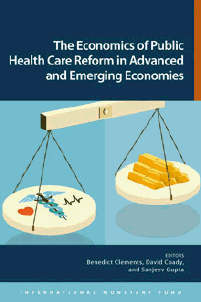
Typical street scene in Santa Ana, El Salvador. (Photo: iStock)
IMF Survey: IMF Weighs in on Health Care Reform
April 25, 2012
- Reforms to health care systems needed, as costs continue to rise
- Private sector can play a role in the financing and provision of health care
- Expanding health care coverage important for many emerging economies
Economies the world over will be hit with rising health care costs at a time when many of them need to undertake large fiscal adjustments to reduce deficits and debt.

Researcher in Japan: Advanced economies may see public health spending increase by as much as 6½ percent of GDP over the next 40 years (Akio Suga/EPA)
FISCAL ISSUES
According to IMF analysis released earlier this week, reforming health care systems should be high on the list of priorities of governments as they continue to work on cutting deficits and debt.
Health care costs have skyrocketed over the past few decades with the introduction of new and very expensive technologies to treat patients. Aging populations are also contributing to cost increases. Faced with uncertainty regarding longer-term recovery prospects for the global economy, governments may soon be in a difficult spot if they fail to make the necessary reforms to health care systems.
“We enjoy a higher quality of health care today, but we have to find a way to finance it,” said IMF Deputy Managing Director Min Zhu. Zhu addressed officials, journalists, and academics gathered at a special seminar to discuss the findings in a new book The Economics of Public Health Care Reform in Advanced and Emerging Economies.
“This new book brings forward a lot of the challenges we face today. Across the world, countries are seeing aging populations, rising costs of health care, or both. We have to take action today in a clear, strong, determined way on a global basis to address these issues,” said Zhu.
Ultimate good is health, not health care
Advanced economies can expect large increases in public health spending—to the tune of 3 percent of GDP over the next 20 years and 6½ percent of GDP over the next 40 years. A third of the cost increase will be due to population aging, with the remaining portion attributed to non-demographic cost drivers, the IMF said.
Though things are less pressing in emerging economies, where public health spending is projected to increase, on average, by 1 percent of GDP over the next two decades, there is scope for health reform to improve the efficiency of health care spending.
University of Southern California Professor Dana Goldman delivered the keynote address at the event. “There is a sense that we might not be getting much value for what we’re spending. The ultimate ‘good’ we want is health, not health care. This realization can have profound effects on health policy,” he said.
Private sector role
There is no one-size-fits-all approach to determining the appropriate role of the private sector in health care systems.
If a country is willing to let health care be rationed among its citizens by price and ability to pay, then it can bring in the private sector to a greater degree in health care financing. If a country aspires to a health system where the quality of health care is roughly the same for everyone regardless of socioeconomic status, then the government will need to step in to a greater extent.
If a country opts for a more egalitarian approach, then private health insurers cannot properly perform the function of collecting premium contributions and risk pooling. Nevertheless, they can still be incorporated into the system to perform purchasing, claims processing, and quality control. Under this approach, private sector efficiencies can have a positive impact on a publicly-run system.
In most countries, the private sector plays a large role in health care provision, covering the entire spectrum of health care services, such as hospital care, primary care and pharmaceuticals.
The proper functioning of the private sector, however, requires strong government regulation due to the imperfections of the health care market.
System reform
Many advanced economies are facing the challenge of controlling the growth of public health spending while, for many emerging economies, the reform challenge is to expand basic health care. In these countries, especially in Asia and Latin America, there is some scope to boost spending. And the good news is that governments have a number of reform options available to them.
The latest reform efforts have already begun to take shape in both advanced and emerging economies. Advanced economies are undertaking a range of reforms aimed at everything from reaping efficiency gains by enhancing competition and choice to realizing administrative efficiencies through better use of information technology.
In emerging economies, some health care systems have successfully expanded health coverage and improved health outcomes without incurring high fiscal costs. Across Asia, for example, many countries are looking to move beyond fee for service to other types of payment systems such as geographic caps, hospital global budgets, and case mix adjustments—which look at ways to base reimbursements on pre-treatment patient risk estimates.

Health care reform must balance various objectives, such as improving health outcomes, controlling spending, and achieving equity, the authors say.
In Asia and elsewhere, there is often overuse of hospital care and underuse of preventive and primary care. Some countries have adopted elements of gatekeeping in primary care to ensure the right mix of service use and to improve health system performance.
In the study, the IMF recommended that cost containment reforms should minimize any potential adverse effects on the poor. Most advanced economies have achieved universal access to basic health services, and health reforms should respect this safety net.
Health care reform is complex and faces the difficult task of balancing different objectives, such as improving health outcomes, controlling spending, and achieving equity, explained IMF economist and one of the three coeditors David Coady, who delivered a presentation at the event.
The book, The Economics of Public Health Care Reform in Advanced and Emerging Economies, is available in the IMF Bookstore.


